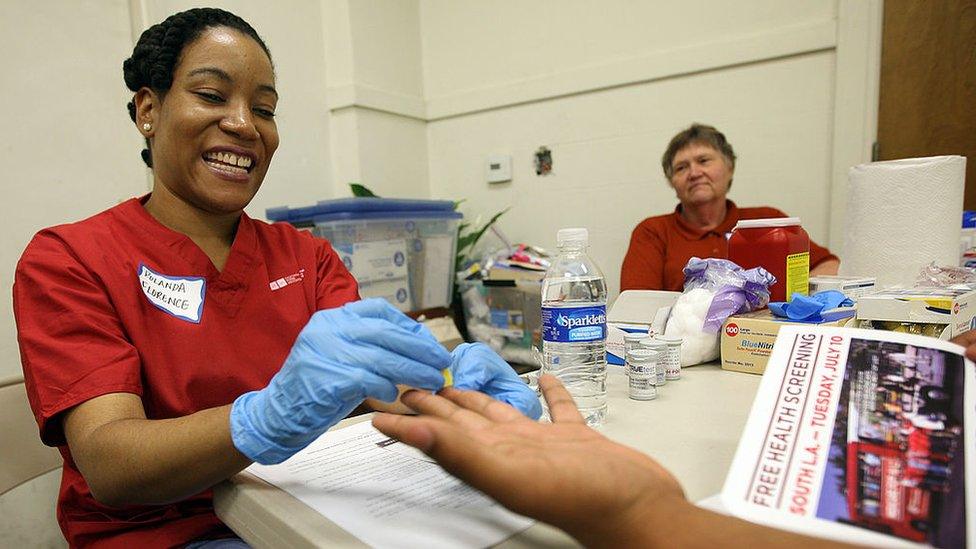Five big consequences of Trumpcare win
- Published
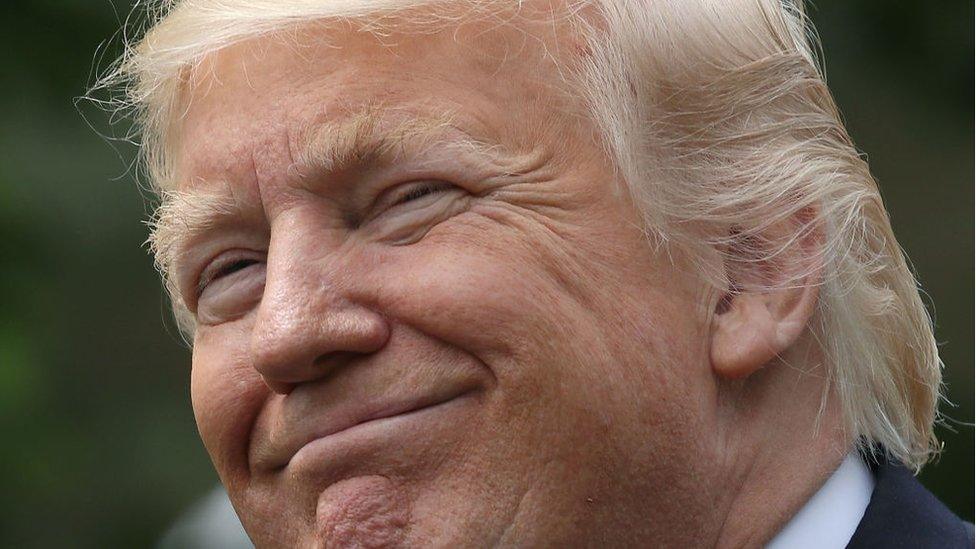
Obamacare repeal lives to see another day, thanks to a concerted effort on the part of the White House and Republican leadership in Congress over the past few weeks.
Passage of the American Health Care Act in the House of Representatives is just round one in a much longer battle, but there's no denying that Thursday's vote will have significant, lasting consequences.
Here are five of them.

Trump and Ryan erase an embarrassing defeat
A month and a half ago House Republicans tried to pass the original version of the American Health Care Act and had to pull it from consideration before a vote it appeared destined to lose.
"Moving from an opposition party to a governing party comes with growing pains," House Speaker Paul Ryan lamented that day. "And, well, we're feeling those growing pains today."
In the Oval Office, a chastened president spoke with reporters.
"We learned a lot about loyalty," he said. "We learned a lot about the vote-getting process."
Paul Ryan was discouraged after Obamacare repeal failed in March
The setback was cited as evidence of fissures within the Republican Party and an indication that Mr Trump wasn't the grand negotiator he imagined he was. It proved to be an open wound that the party couldn't get past.
Although the president said it was his intention to move on to tax reform, and Mr Ryan said Obamacare would be around "for the foreseeable future", the White House and congressional leaders continued to grind away at finding a compromise that would garner enough party support to pass.
In the end they found it - by first locking down the House Freedom Caucus conservatives and then peeling away enough moderates to put them over the top. Barely.
It was all smiles in the White House Rose Garden on Thursday afternoon, however, as Mr Trump and Mr Ryan were able to put their first major legislative accomplishment on the board.

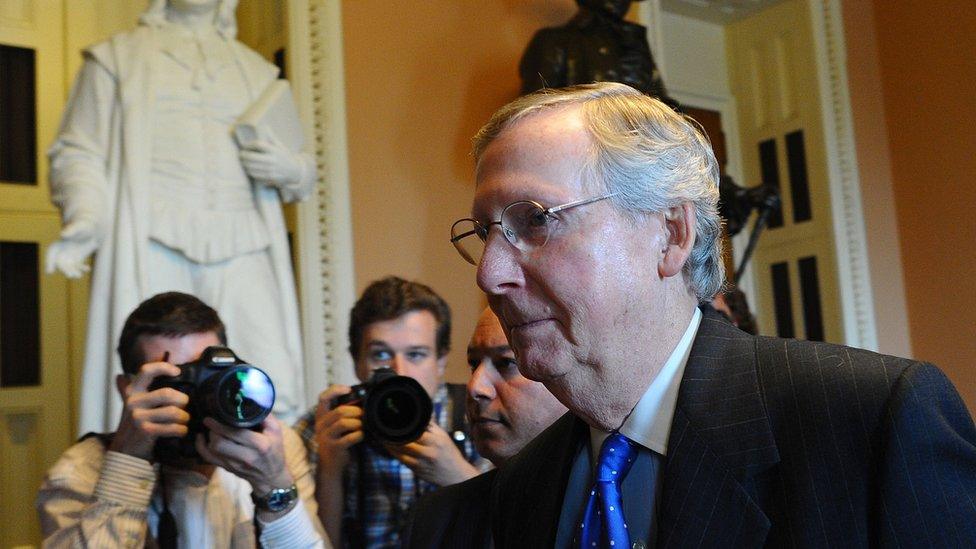
Senate Majority Leader Mitch McConnell has his work cut out for him
All eyes on the Senate
With passage in the House of Representatives, the legislation now moves to the Senate, where it will face even greater challenges.
While Mr Ryan had a large Republican majority in the House, Senate Majority Leader Mitch McConnell can only afford to lose two votes - and already some members of his party are expressing reservations.
"I don't support the House bill as currently constructed because I continue to have concerns that this bill does not do enough to protect Ohio's Medicaid Expansion population," Senator Rob Portman said in a press release, external."
Bloomberg News reported, external that several key Republican senators were already making plans to disregard the House bill and craft their own healthcare legislation from scratch.
Coming up with a solution that satisfies both hard-liners and moderates will be a formidable task in the Senate, as it proved to be in the House. Democratic senators, who have considerable powers even in the minority, will disrupt the process whenever possible. It's a recipe for a political logjam that will be difficult to resolve.
"I know that our friends in the Senate are eager to get to work," Mr Ryan said at the White House celebratory event on Thursday.
The crowd of Republican politicians and staffers laughed. They know better.

More uncertainty for US healthcare

If the House bill as written were to become law it would send shockwaves through the US healthcare system, forcing insurance companies, medical providers and related companies to adjust to a new reality just years after Obamacare reforms had caused their own upheavals.
Medicaid, the health insurance programme for the poor, would see significant cuts. Government insurance mandates would be repealed. Taxes on wealthy individuals that paid for insurance subsidies for lower-income groups would be rescinded. States would be given greater discretion to do away with minimum levels of insurance coverage.
According to the Congressional Budget Office, which analysed an earlier version of the legislation, more than 24 million more Americans would be uninsured under the American Health Care Act. Premiums would eventually drop around 10%. The federal budget deficit would go down by $150 billion over 10 years (although this number will surely change when the new version is scored next week).
Healthcare battle in rural America
Already the uncertainty is taking its toll. The last company participating in the Iowa individual insurance market may soon withdraw. Another major provider is pulling out of Virginia. In numerous states, the system for those who don't have insurance from the government or private employers is under significant strain.
For a while it looked like the current Obamacare system would continue to muddle along intact, giving the healthcare industry some modicum of continuity. Instead the prospect of major change continues to loom on the horizon.
Given that the Senate will likely have its own, markedly different version of reforms soon, that uncertainty is only likely to grow.

Democrats will use it in 2018 midterms battle
Following the successful passage of the American Health Care Act in the House, Democrats on the floor waved to their Republican colleagues and sang "Hey, hey, hey, goodbye".
The moment recalled similar behaviour by Republican legislators in 1993, when they mocked Democrats for backing a sweeping tax increase in the early days of the Bill Clinton administration.
Protesters yell 'shame' at politicians over healthcare bill
The Democratic Party suffered a resounding defeat in the midterm elections of 1994, and Democrats believe this vote will have a similar devastating effect on their adversaries in the November 2018 elections.
What's certain is that Democratic candidates are going to do their best to paint the bill as a major tax cut for the rich, paid for with reduced benefits for the middle class and working poor. Already one Democrat running for governor in Virginia has cut a television advert, external condemning the bill, featuring an ambulance being slowly crushed in a compactor.
The nature of the House bill, which gives states considerable discretion in rolling back Obamacare, could also cast a spotlight on the 38 governor races in the next two years, as well as the battles for control of state legislatures.
Republicans currently have the upper hand across much of the US, but their majorities could be at risk if a Democratic electoral wave emerges.

Obama's legacy is at risk
Obamacare was the crown jewel of President Barack Obama's legislative achievements. Democrats paid a dear price at the ballot box for enacting the reforms, but it was a decades-long goal for the party that was viewed, by many, to be worth the sacrifice.
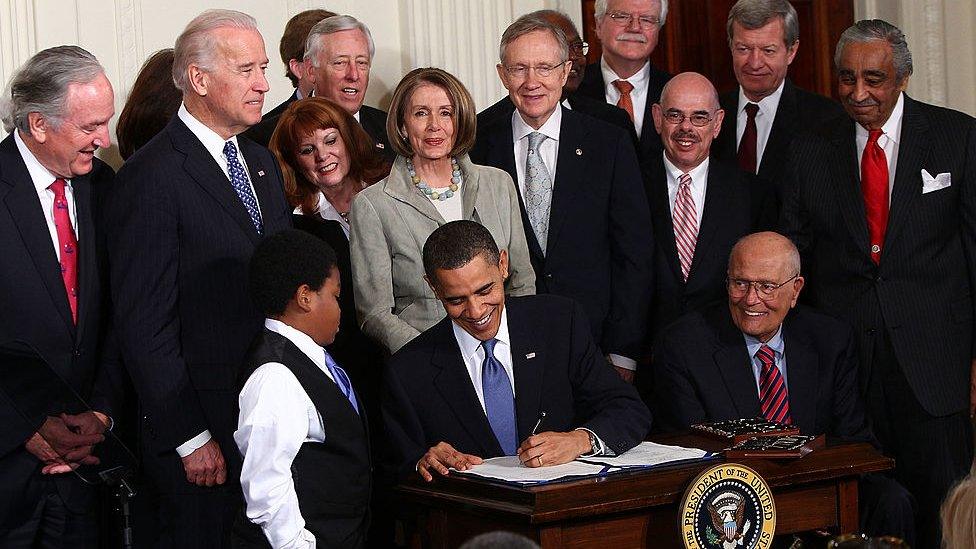
US President Barack Obama signs the Affordable Health Care for America Act in March 2010
"This is a big effing deal," Vice-President Joe Biden memorably whispered to Mr Obama during the law's White House signing ceremony.
Now that big deal is one step closer to being a relic of the past.
At the same time the Obamacare repeal bill moved on to the Senate, a House committee approved legislation rolling back Mr Obama's Wall Street financial reforms. Step by step, the Republican-controlled Congress may be taking an axe to everything the Democrats accomplished during Mr Obama's eight years in office.
Environmental regulations are in the crosshairs, as is much of the tax-and-spending policy compromises Democrats and Republicans agreed on in 2013
Elections, as they say, have consequences.
- Published4 May 2017
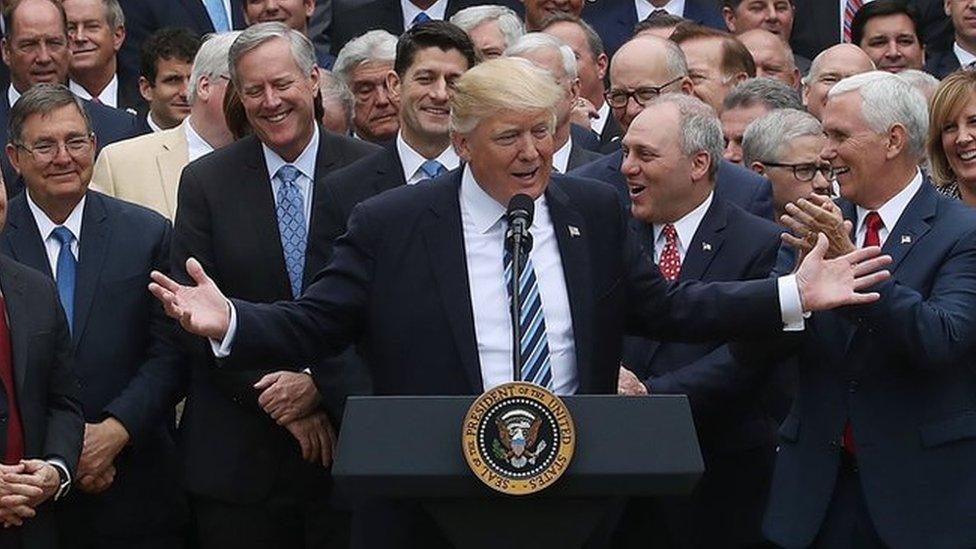
- Published20 September 2017
